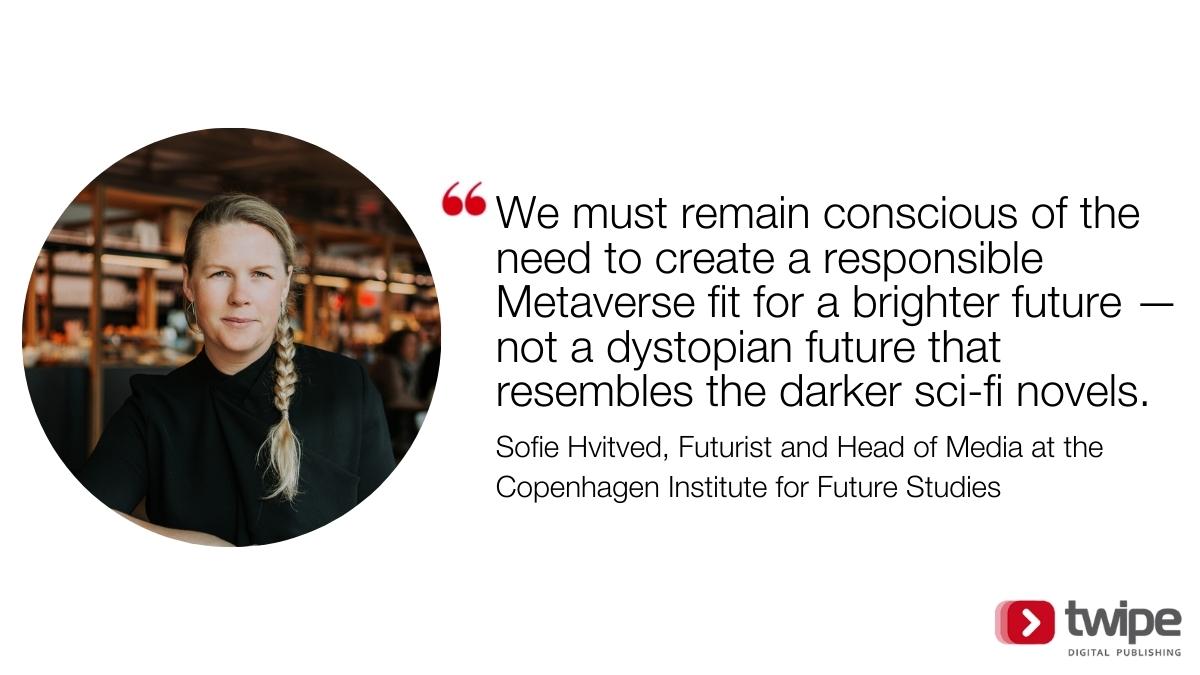Blog
Embracing the Metaverse is all about the long-term perspective

Written by Sofie Hvitved, Futurist, Senior Advisor & Head of Media at Copenhagen Institute for Futures Studies
Imagine a future where the physical and virtual worlds have merged. Where our surroundings are supplemented with virtual layers, enabling us to experience and interact in completely new ways. What might the different possible futures look like? How is this going to influence your life? And how will the development affect the way we live?
If you ask many of the big tech companies, we will experience a much greater overlap between our physical and virtual lives in the next big evolution of the internet: the Metaverse.
As technology becomes more omnipresent, a larger portion of our daily activities will move online into more immersive experiences. The media industry will need to figure out how to seamlessly connect digital and physical experiences and at the same time create new models for engagement with an audience that are constantly getting new expectations for their media consumption.
Additionally, Web3 opens up a new ownership economy in which all businesses must eventually think about their position and potential within the Metaverse going from direct-to-consumer to direct-to-avatar and creating new relations with the users. How will this adaption unfold and what role will media play? What challenges does the Metaverse bring for the media industry and for our society?

What will the future bring?
Being a futurist, I think the question we should be asking ourselves is not when the Metaverse will actually be realised, but rather how the Metaverse potentially will play out. Rather than defining what it is today, I find it more productive to define what it might become. Once the technologies and use cases supporting the concept have matured, the Metaverse will revolutionise society. This creates a need for anticipation and preparation. Who will structure it? How will it be build? Who will govern it? Will we see some kind of a cohesive society emerge with shared values and a shared understanding of the world? Or will it be spread out in unrelated bubbles?
At the Copenhagen Institute for Futures Studies, we spend our time challenging and inspiring perspectives on the future and help organisations to get a better and deeper understanding of the critical uncertainties. Hence we have created a number of future scenarios of the Metaverse built on some of the biggest uncertainties: Will it be open (the dream of web3) or proprietary (more of the same as web2)? Will it it will be convergent (one big Metaverse) or separate (a lot of smaller Metaverses). This creates four different scenarios:
- The Free Metaverse
- The Nerdverse
- One Metaverse to rule them all
- Betaverses Disunited
Read more about the four scenarios in our whitepaper.
I must admit. A lot of reports are being published about the Metaverse, and the opinions expressed are many: Is it just a new hype and a way for Big Tech to divert our attention from the myriad of ongoing accusations being levelled at them regarding monopoly creation, misinformation and other failing responsibilities, or is it the real deal?
Examples pointing towards the future of the Metaverse
The Metaverse offers unprecedented amounts of data and digital items, and will be filled with content and immersive experiences created and operated by an incredibly wide range of contributors — including AI algorithms. Many of these features already exist and are seen in the gaming industry, but the Metaverse is far more than ‘just’ entertainment.
Before we can act upon the Metaverse, we must educate ourselves. Below are some of the projects that I believe are pointing towards the future of the media industry in the Metaverse.
AR extending storytelling on Disney+ short film
One way to see how the new immersive layers might be impacting content production is the new short film Remembering that was recently launched on Disney+ in the US. The short film uses first-of-its-kind technology via an Augmented Reality app that allows viewers to interact with the story by scanning the TV with their smartphones or iPads to extend the visual layers into their rooms.
The short film is not available in Europe, but click here for more information.
Snap x Live Nation
According to McKinsey it is entirely plausible that more than 50% of live events could be held in the Metaverse in 2030. We see a lot of experimentation on both concerts in virtual worlds as well as augmented layers on top of live experiences, and I believe that especially the latter could be a big impact in the media industry. The collaboration between Snap and Live Nation is an interesting project to follow in that direction.
Alter ego – when our avatars perform on a live stage
The new reality series Alter Ego launched as a new concept last year where the artists perform as virtual avatars on a physical stage. The premise of the show is that the contestants sing backstage while motion capture technology creates digital avatars that appear in their place, and it shows some of the possibilities in the merge of virtual and physical entertainment.
MTV’s move towards the Metaverse
Eminem and Snoop Dogg performed as two Bored Ape avatars at the MTV VMA 2022 – a show that also included the new category ‘Best Metaverse Performance’ for the first time. MTV, which is part of Paramount Media Networks, also created a VMA experience on Roblox to reach younger viewers and to learn about the platform.
Check out https://www.mtv.com/vma/vote/best-metaverse-performance
TIME Magazines Web 3 Strategy
The new virtual infrastructure provides unique opportunities to create ownership and offers new degrees of commitment by giving utility and engagement. TIME is one of my favourite publication companies I mention when it comes to this aspect. They have been early adopters of the technology and sold more than 20.000 NFT’s, earning them more than $10M. Their plan is to move their subscription model completely over to web3 in the next couple of years and I for one look forward to following that brave journey.
Learn more from William Ban, VP Operations Web3 at TIME on the strategy at the Digital Growth Summit or visit https://time.com/collection/timepieces-nft/.
NFT-based Fox Series Krapopolis
NFT’s are all about creating new engagement and relationship with the users. But is it possible to get the audience to co-create the plot of a series through digital ownership? That is the goal of the new series “Krapopolis” created co-creator of Rick and Morty, screenwriter Dan Harmon produced by the animation studio Bento Box Entertainment – owned by Fox Entertainment. Krapopolis will be the first animated series based on blockchain and they already launched a site dedicated to Krapopolis where you can buy various digital products such as NFT’s and “superfan” tokens that can give access to “exclusive social experiences”.
Visit https://www.krapopolis.com/
Runway – AI generated content
‘Magical’ AI tools such as DALL-E 2, Midjourney and Stable Diffusion are flooding my feed right now. And if you combine that with realtime collaboration and precision editing you get Runway – the next-generation video creation suite. And again, if you combine this technology with 3D productions as we are starting to see examples of with the Builderbot project at Meta in virtual reality with speech-to-image technology, we see an extreme democratisation and empowerment of content creation.
Check out https://runwayml.com/
Embracing the long-term perspectives
When I was a teenager, I was deeply fascinated by sci-fi and cyberpunk, reading books by William Gibson, Jeff Noon and the like. The term Metaverse originated in a sci-fi novel, ‘Snow Crash’ — a dystopian story from 1992 by Neal Stephenson, about a collapsed America in which the Metaverse is a virtual world without any rules, owned by corporate franchises, where the citizens can escape their miserable IRL. Not really an ideal vision for the future — so hopefully the Metaverse that we will see will have a different structure and goal which is not about abandoning our physical lives in favour of a consumer-orientated virtual world.
There is no doubt that the creators of the Metaverse will possess extreme power when designing the structure and the new economies that will emerge in this new world of synthetic media. We are already seeing the beginning of the virtual economy, where you can buy avatars, virtual clothes and artefacts as NFTs (Non-Fungible Tokens). But these economies are fragile and could end up as a huge collective illusion of ownership online, with a possible collapse of virtual economies as a result.
There is also the issue of the extreme amount of surveillance around your every move in the Metaverse, which thus knows what to present to you next, like a never-ending TikTok stream. Who should be in charge of the algorithms that decide this? Even Mark Zuckerberg knows this. In an interview with The Verge when he first started talking about the move towards the Metaverse, he explained “it’s certainly not something that any one company is going to build”. Luckily, we won’t have to fear that Facebook will own the Metaverse.
Embracing the Metaverse means embracing long-term thinking, because the Metaverse will take a long time to unfold. In this process we must remember to take it seriously and remain conscious of the need to create a responsible Metaverse fit for a brighter future — not a dystopian future that resembles the darker sci-fi novels. We need to find a way for this merge of our physical and virtual lives to make sense – not just in order to create new revenue streams but also to ensure an ethical approach to the Metaverse that is based on respect for privacy, sustainability and values such as diversity, equity and inclusion.
Other Blog Posts

Stay on top of the game
Subscribe to Twipe’s weekly newsletter to receive industry insights, case studies, and event invitations.
"(Required)" indicates required fields



